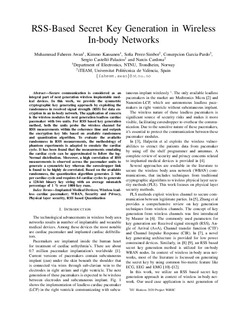| dc.contributor.author | Awan, Muhammad Faheem | |
| dc.contributor.author | Kansanen, Kimmo | |
| dc.contributor.author | perez, Sofia | |
| dc.contributor.author | García-Pardo, Concepción | |
| dc.contributor.author | Cardona, Narcís | |
| dc.date.accessioned | 2019-06-28T10:41:47Z | |
| dc.date.available | 2019-06-28T10:41:47Z | |
| dc.date.created | 2019-06-27T11:41:55Z | |
| dc.date.issued | 2019 | |
| dc.identifier.isbn | 978-1-7281-2342-4 | |
| dc.identifier.uri | http://hdl.handle.net/11250/2602790 | |
| dc.description.abstract | Secure communication is considered as an integral part of next generation wireless implantable medical devices. In this work, we provide the symmetric cryptographic key generating approach by exploiting the randomness in received signal strength (RSS) for data encryption in an in-body network. The application of concern is the wireless modules for next generation leadless cardiac pacemaker with two units. For RSS based key generation method, both the units probe the wireless channel for RSS measurements within the coherence time and outputs the encryption key bits based on available randomness and quantization algorithm. To evaluate the available randomness in RSS measurements, the methodology of phantom experiments is adapted to emulate the cardiac cycle. It has been found that the measurements emulating the cardiac cycle can be approximated to follow the log-Normal distribution. Moreover, a high correlation of RSS measurements is observed across the pacemaker units to generate a symmetric key whereas the eavesdropper link is found to be highly de-correlated. Based on the available randomness, the quantization algorithm generates 2-bits per cardiac cycle and requires 64 cardiac cycles to generate a 128-bit binary key string with an average mismatch percentage of 1 % over 1000 key runs. | nb_NO |
| dc.language.iso | eng | nb_NO |
| dc.publisher | Institute of Electrical and Electronics Engineers (IEEE) | nb_NO |
| dc.relation.ispartof | International Symposium on Medical Information and Communication Technology | |
| dc.relation.ispartofseries | International Symposium on Medical Information and Communication Technology; | |
| dc.title | RSS-Based Secret Key Generation in Wireless In-body Networks | nb_NO |
| dc.type | Chapter | nb_NO |
| dc.description.version | acceptedVersion | nb_NO |
| dc.source.pagenumber | 6 | nb_NO |
| dc.source.volume | 13 | nb_NO |
| dc.source.issue | CFP1941M-ART | nb_NO |
| dc.identifier.doi | 10.1109/ISMICT.2019.8743933 | |
| dc.identifier.cristin | 1708259 | |
| dc.relation.project | EC/H2020/675353 | nb_NO |
| dc.description.localcode | © 2019 IEEE. Personal use of this material is permitted. Permission from IEEE must be obtained for all other uses, in any current or future media, including reprinting/republishing this material for advertising or promotional purposes, creating new collective works, for resale or redistribution to servers or lists, or reuse of any copyrighted component of this work in other works. | nb_NO |
| cristin.unitcode | 194,63,35,0 | |
| cristin.unitname | Institutt for elektroniske systemer | |
| cristin.ispublished | true | |
| cristin.fulltext | postprint | |
